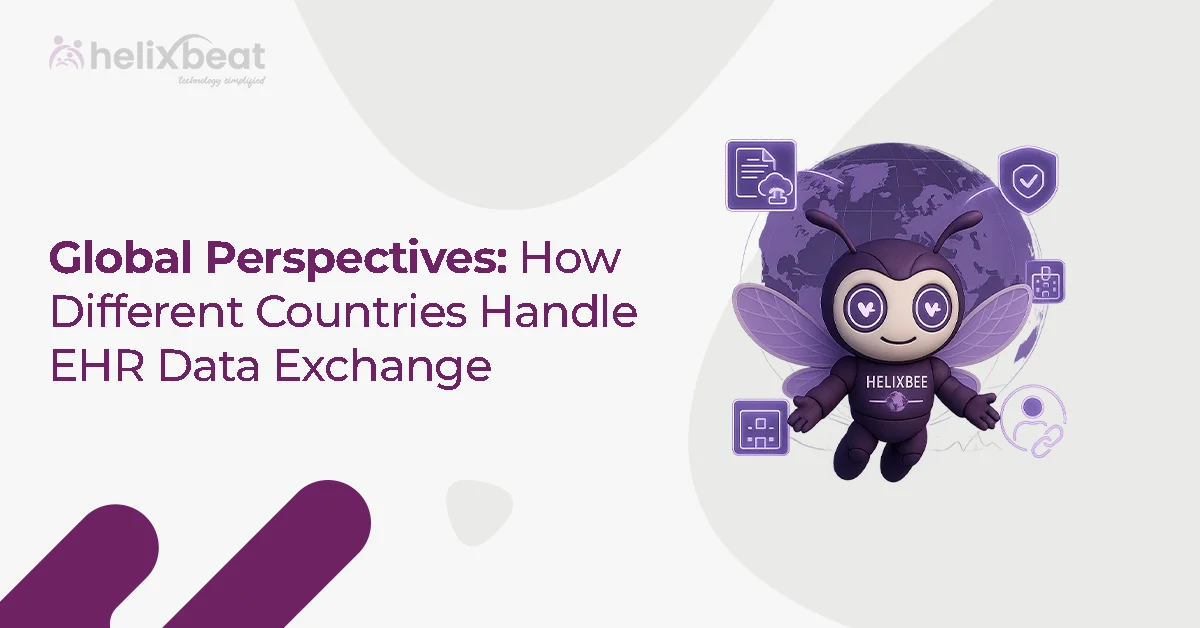EHR data exchange is transforming healthcare by enabling real-time, secure access to patient information across different systems and geographies. It is essential for improving patient care, reducing medical errors, and enhancing collaboration among healthcare providers. Yet, it also presents complex challenges in ensuring data privacy, compliance, and interoperability. Countries around the world are approaching EHR data exchange with varying levels of regulation, infrastructure, and technology, and these differences have significant implications for patient engagement and healthcare outcomes. In this blog, we’ll explore how different countries manage the secure exchange of EHR data, how these systems impact patient engagement, and how HelixBeat’s PULSE platform facilitates secure, efficient data sharing across borders.
Table of Contents
How the United States Handles EHR Data Exchange
The United States has made considerable progress in digitizing healthcare information, with significant investments in Electronic Health Record (EHR) systems. A pivotal piece of legislation facilitating this change is the Health Information Technology for Economic and Clinical Health (HITECH) Act, which encouraged healthcare providers to implement EHR systems.
Consequently, the EHR data exchange network in the U.S. has become increasingly interconnected, enabling healthcare professionals to access patient information in real-time across various systems and organizations. Currently, the secure sharing of EHR data is overseen by stringent regulations, with the Health Insurance Portability and Accountability Act (HIPAA) serving as the foundational law to ensure data privacy and security.

The Role of HIPAA in Secure Data Exchange
HIPAA sets the gold standard for protecting health information in the U.S. When it comes to EHR data exchange, compliance with HIPAA is mandatory. The regulations ensure that sensitive patient data is protected while being shared across healthcare systems.
Here are the key security measures mandated by HIPAA that are integral to secure EHR data exchange:
- Data Encryption
- HIPAA mandates that all patient data must be encrypted, both during transmission (when it’s moving between systems) and at rest (when it’s stored on servers).
- This ensures that even if data is intercepted, it remains unreadable and secure.
- Access Control
- To prevent unauthorized access, HIPAA enforces role-based access control.
- Only authorized users, such as doctors, nurses, or medical administrators, are granted access to patient records, based on their role within the organization.
- This limits exposure and ensures that data is only accessible to those who need it for care delivery.
- Audit Trails
- HIPAA requires that all interactions with patient data be logged in audit trails.
- This means every access or modification to patient records is fully tracked, providing transparency and accountability.
- These logs ensure that any unauthorized access or data modifications can be identified and addressed promptly.
Europe’s Approach to EHR Data Exchange
Europe has adopted a more centralized approach to EHR data exchange, with many countries pushing for cross-border interoperability. The General Data Protection Regulation (GDPR) plays a central role in shaping how patient data is shared across the continent.
The GDPR Framework
Under the GDPR, patient data must be:
- Explicit consent must be obtained from the patient before any information is shared.
- Pseudonymized to ensure that patient identities are protected during the exchange.
- Transferred with adequate security measures to prevent unauthorized access.
- The EU’s eHealth network also works towards cross-border EHR data exchange to ensure that patient data can be shared securely between member states, improving patient engagement in healthcare for residents traveling within Europe.
Canada: Balancing Privacy with Digital Health
Canada’s EHR system is built on a collaborative approach between the government and healthcare providers. The country’s national eHealth framework, led by Canada Health Infoway, enables secure and efficient exchange of EHR data across provinces.
Canada Health Infoway:
- Digital Health Record: Canada Health Infoway supports a national infrastructure that connects patients to their health records through interoperable EHR platforms.
- Patient-Centric Solutions: Patients can access their records, ensuring active participation in their own healthcare.
- While Canada emphasizes patient privacy and consent, the system also encourages digital patient engagement by making it easier for patients to interact with their healthcare providers via patient engagement software and online portals.
Australia’s EHR System: My Health Record
Australia’s My Health Record system provides a national digital health record that connects patients and healthcare providers. It enables the sharing of health information in real-time, providing an efficient and secure method for managing patient care.
Patient Engagement and Digital Health in Australia:
- Secure Data Sharing: Health information is stored securely, allowing doctors, nurses, and specialists to access patient records from anywhere in the country.
- Patient-Controlled Access: Patients have control over who can access their health information, enhancing trust and encouraging greater patient engagement.
Asia’s Emerging EHR Ecosystem
Both nations are on the path to revolutionizing healthcare through digital means. However, for effective EHR data exchange, addressing infrastructural challenges, ensuring data privacy, and fostering interoperability between systems are crucial.
| Country | Initiative | EHR Adoption Status | Key Challenges | Recent Developments |
| China | National EHR Implementation Plan (2025 | Approximately 45% adoption rate | Rural-urban disparity, fragmented IT infrastructure, and regulatory complexities. | Rapid integration of AI in tertiary hospitals; DeepSeek AI system deployed nationwide |
| India | National Digital Health Mission (NDHM) | Over 6.2 crore ABHA IDs issued; 1.2 crore linked with EHRs | Inconsistent state-level implementation, data privacy concerns | Integration of e-Aushadhi medicine distribution with Integrated Health Management System (iHMS) to generate real-time EHRs |
HelixBeat’s PULSE: A Secure EHR Data Exchange Solution
The exchange of EHR data is crucial for healthcare providers to deliver efficient and seamless care. HelixBeat’s PULSE platform guarantees that this data exchange is secure and promotes collaboration among doctors, patients, and medical teams, regardless of their global locations. PULSE is designed with extensive security features, enabling your healthcare organization to share patient information across borders while safeguarding patient confidentiality.
Key Features of PULSE
- End-to-End Encryption
- PULSE ensures that patient information is encrypted from the moment it is transmitted until it is securely stored.
- Whether data is being sent to a specialist in another city or across various hospital systems, the information remains completely safeguarded, preventing unauthorized access or manipulation of sensitive health data.
- Compliance with HIPAA
- PULSE adheres to the highest standards of data privacy and security through full compliance with the Health Insurance Portability and Accountability Act (HIPAA).
- This means healthcare providers can have peace of mind knowing that every component of their data exchange is in line with both U.S. and European regulations, protecting patient information and their organization from legal liabilities.
- Real-Time Data Sharing
- Immediate access to patient data is vital for making informed decisions promptly.
- PULSE facilitates real-time data sharing, enabling healthcare teams to exchange essential information swiftly.
- This results in improved patient outcomes by reducing delays in diagnoses, treatment, and care coordination.
CTA: Learn how PULSE Can Transform Your Data Exchange with a free Demo
Why Using PULSE Will Make You Stand Out
PULSE delivers more than just secure data exchange; it empowers your healthcare organization to:
- Earn Patient Trust
- Patients are increasingly wary about the privacy of their information.
- By utilizing PULSE, you demonstrate to patients that their data is managed with the highest security standards, making them more inclined to trust and engage with your services.
- Streamline Your Operations
- PULSE enhances workflow efficiency through secure real-time data exchange, minimizing the potential for errors and complications that often occur in fragmented data systems.
- With PULSE, you can offer faster, more accurate care while lowering administrative burdens.
- Prepare for the Future
- Healthcare regulations are continually evolving.
- PULSE keeps your organization ahead by adapting to new policies and technologies without disrupting your operations.
- Whether you’re expanding internationally or enhancing your patient engagement initiatives, PULSE ensures that your data-sharing practices remain secure and compliant.
Final Insights
EHR data exchange is not just a technical process; it’s the key to enhancing patient care, promoting better communication between healthcare providers, and ensuring patients are actively engaged in their healthcare journeys. As countries around the world develop their own systems for sharing electronic health records, one thing is clear: the future of healthcare lies in seamless, secure data exchange.
Whether you’re a healthcare provider in the U.S. dealing with HIPAA compliance or a global health system seeking to enhance patient engagement, EHR data exchange is crucial for delivering improved patient outcomes. Helixbeat’s PULSE platform makes that possible by offering a secure, compliant, and real-time solution that enhances collaboration and keeps patient data protected.
Are you ready to unlock the full potential of EHR data exchange? With PULSE, you can ensure your data exchange is secure, efficient, and fully compliant with international standards.
Take the Next Step in Healthcare Security and request Your Personalized Demo of PULSE Today!
FAQs
- What is EHR data exchange?
EHR data exchange refers to the secure sharing of electronic health records between healthcare providers, improving care coordination and patient outcomes.
- How does PULSE ensure secure data exchange?
PULSE uses end-to-end encryption, HIPAA and GDPR compliance, and role-based access controls to ensure the secure exchange of patient data.
- Can PULSE be used across countries?
Yes, PULSE is designed to comply with global data protection regulations, allowing healthcare providers to exchange data securely across borders.
- How does PULSE improve patient engagement?
PULSE enables secure, real-time communication between patients and providers, allowing patients to be more involved in their care.
- What countries does PULSE support?
PULSE supports global data exchange, including compliance with HIPAA (USA), GDPR (Europe), and other international standards.
- How do healthcare providers benefit from PULSE?
Providers benefit from secure data exchange, improved patient engagement, and streamlined patient management processes.
- Is PULSE easy to integrate with existing EHR systems?
Yes, PULSE offers seamless EHR integration with existing systems, ensuring smooth data exchange without disruption.
- Can patients access their records through PULSE?
Yes, PULSE allows patients to access their health records securely and manage their healthcare more effectively.
- What role does patient engagement play in data exchange?
Patient engagement is crucial for ensuring patients actively participate in their care and for improving healthcare outcomes through better communication and access to information.
- What security measures are in place for EHR data exchange?
PULSE employs end-to-end encryption, multi-factor authentication, and audit trails to protect sensitive patient data during exchange.
- How does PULSE comply with international data protection standards?
PULSE is fully compliant with HIPAA, GDPR, and other international regulations, ensuring secure and legal data handling.
- Why is secure EHR data exchange important for healthcare providers?
Secure data exchange ensures privacy, compliance, and efficient care coordination, improving outcomes and reducing administrative costs.













